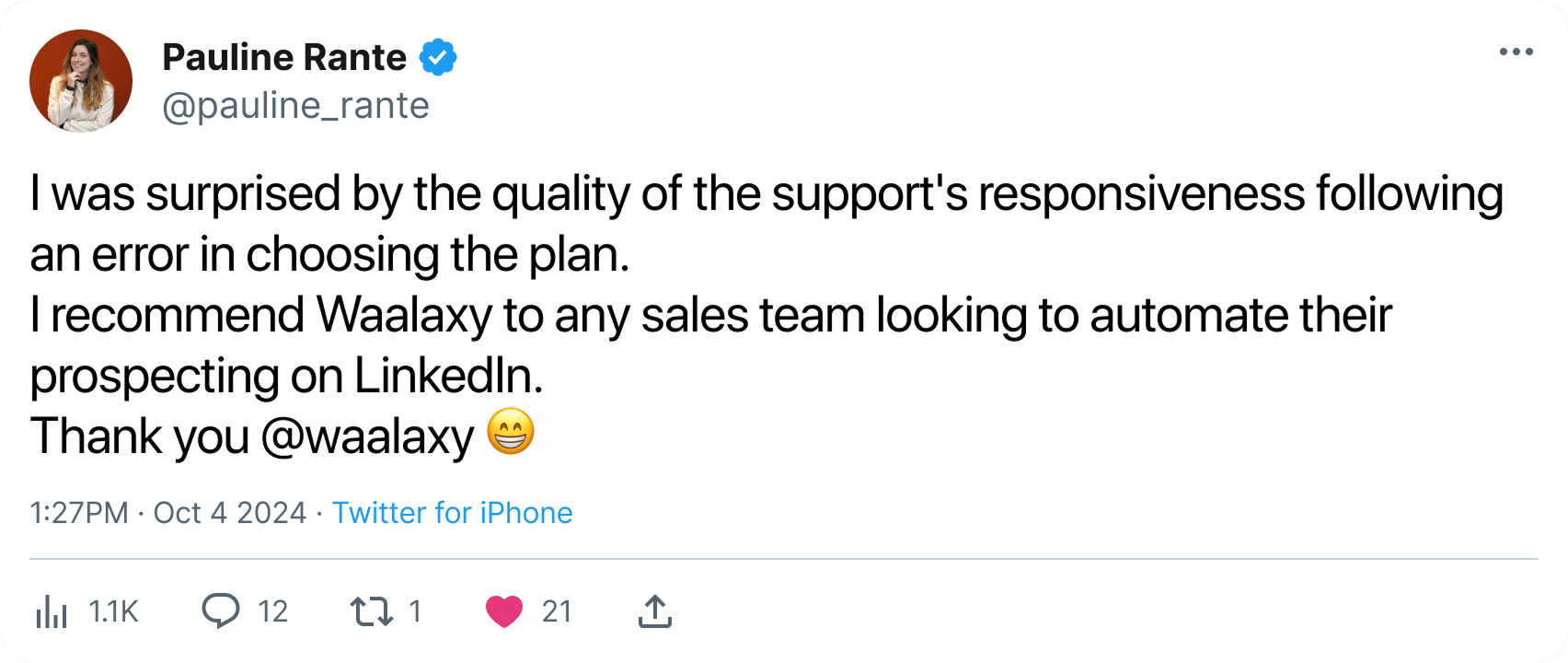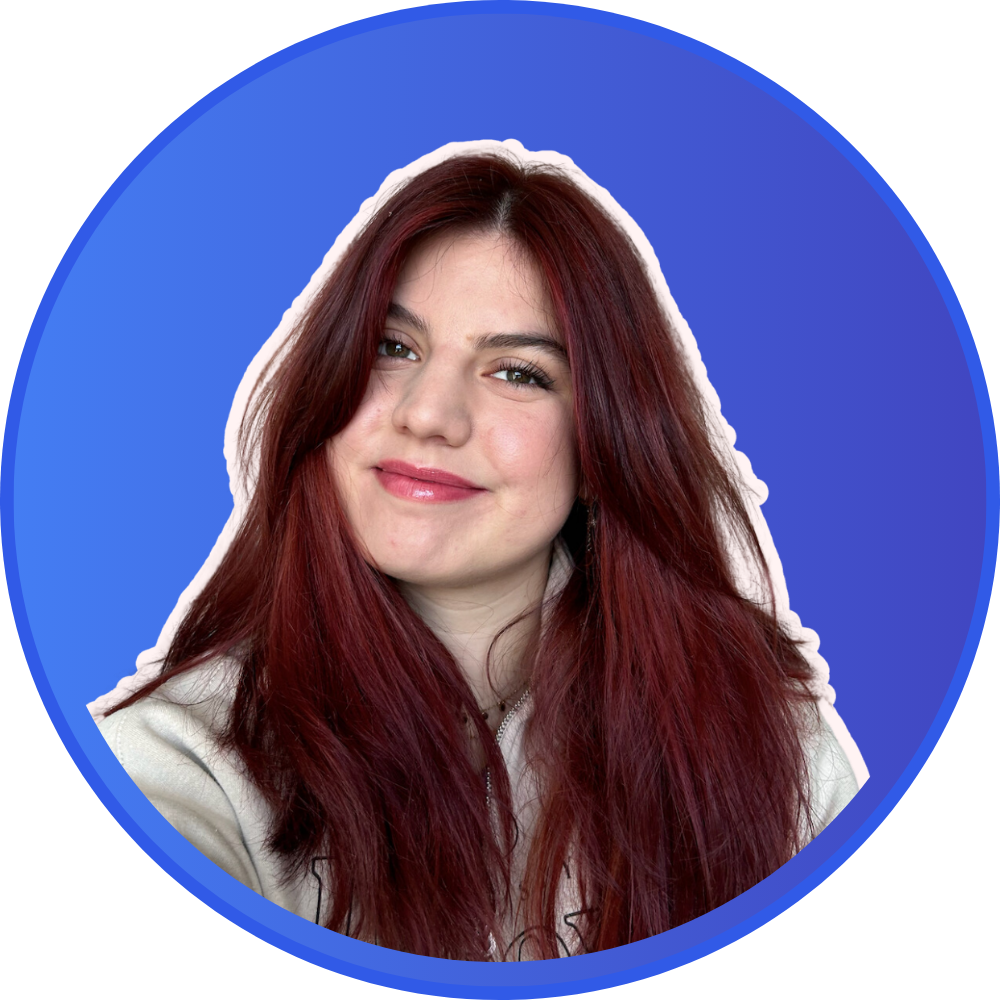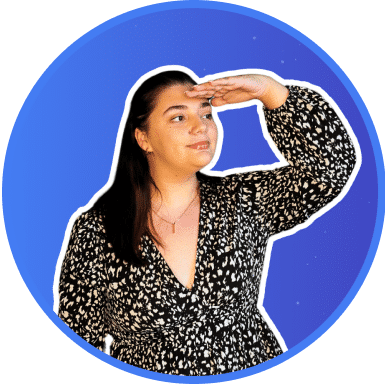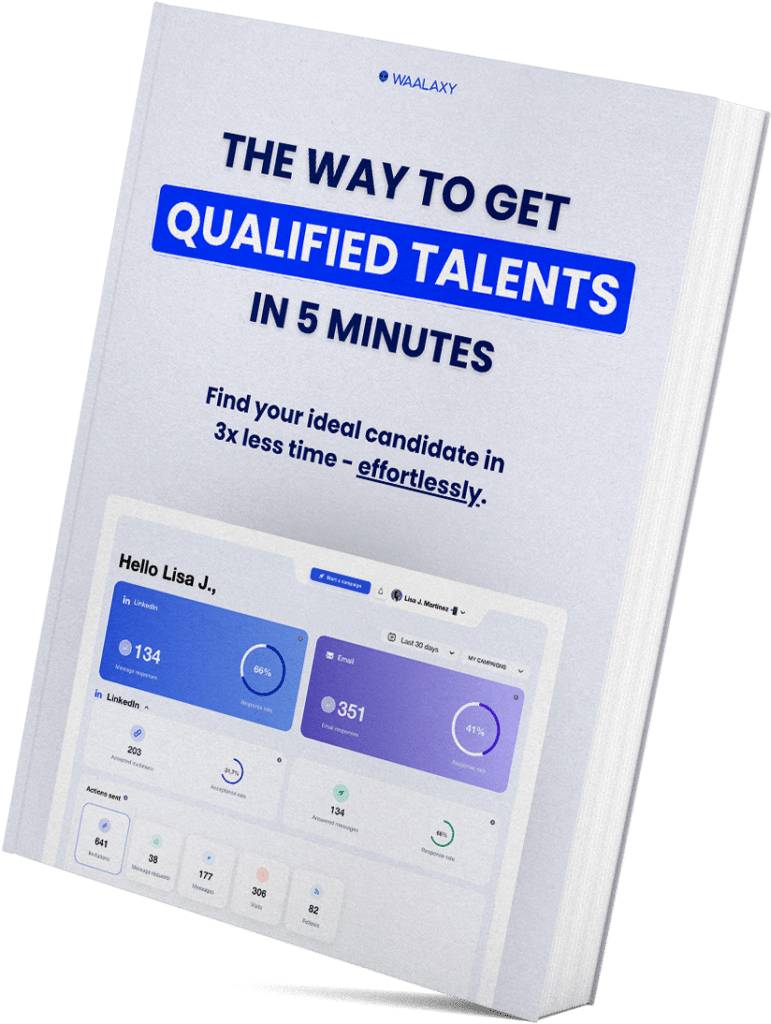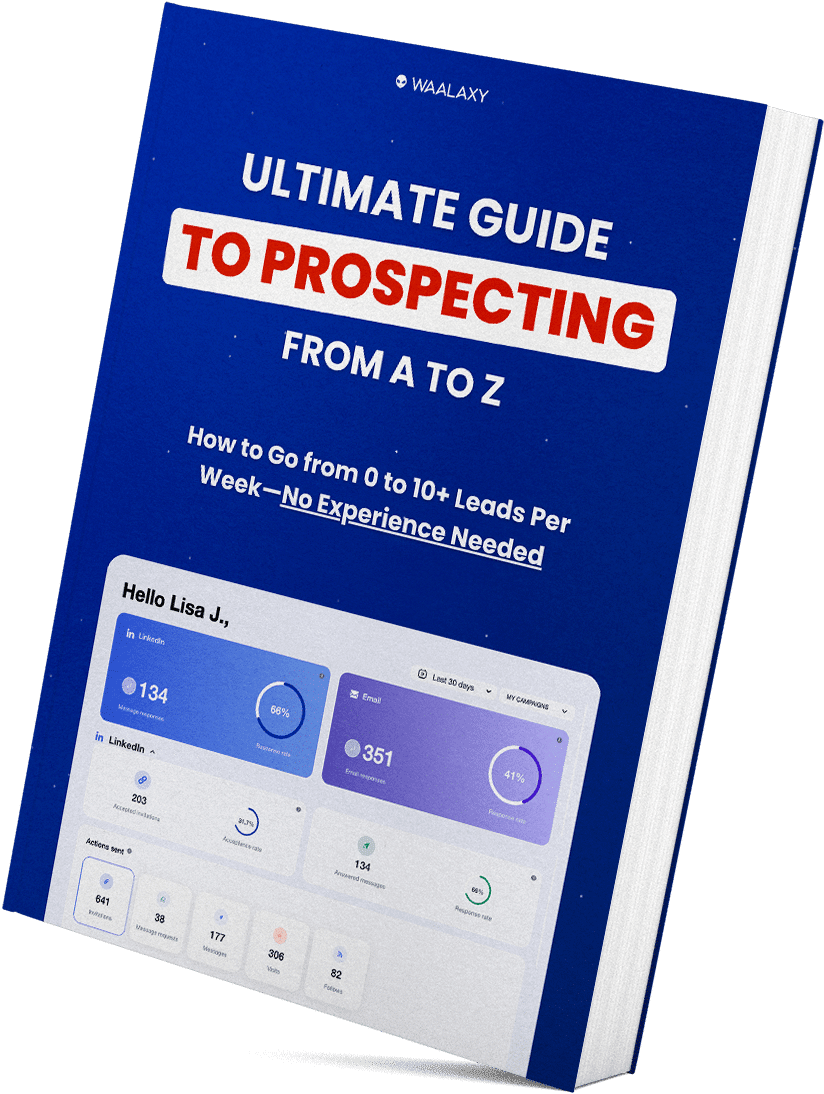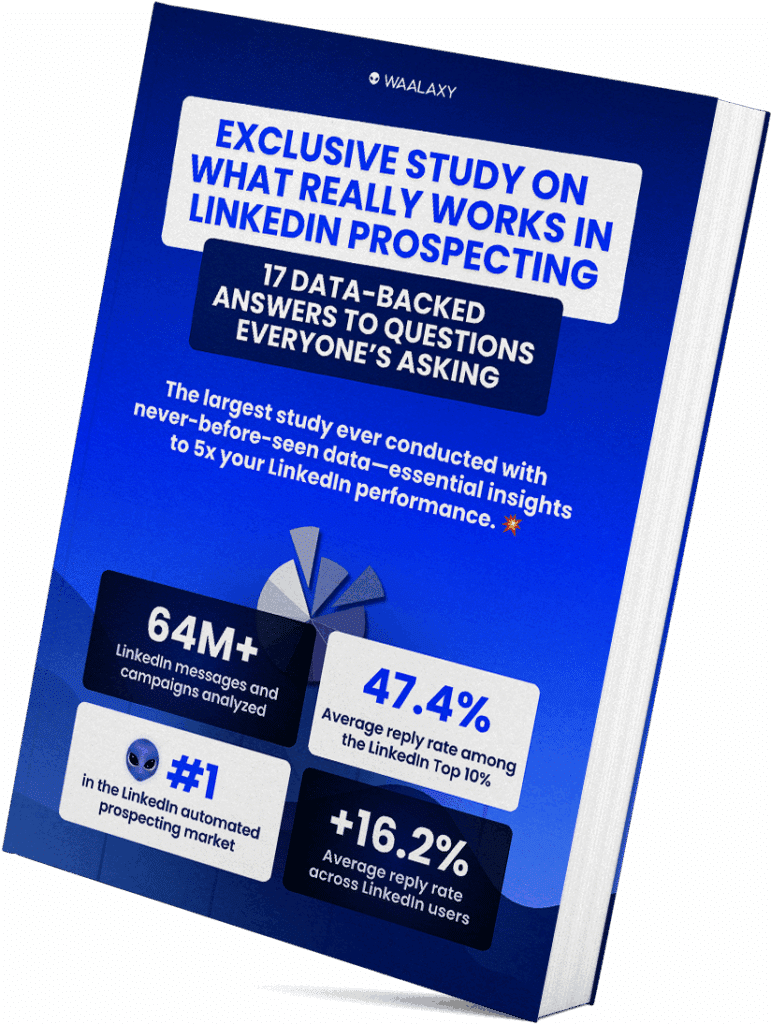Hello young Padawan. If you got here, it’s because we have a common mission, to grow your business on LinkedIn.
We will escort you and train you to master LinkedIn prospecting.
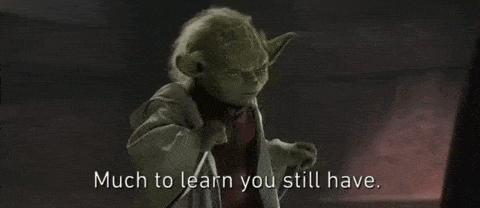
At the end of this Jedi training, you’ll be finding abundant fields of potential customers.
You will have learned to master LinkedIn completely by going through these steps:
- How to use the network, thanks to our best tips. 😉
- How to take advantage of LinkedIn, gaining customers and increasing your sales. 💥
- The Secrets of Social Networking: Our growth hacking techniques and how to reproduce them. 💪
- How to automate your actions on LinkedIn, to save a lot of time during your prospecting journey. 😲
You are certainly not going to read all these lines in one day and you are quite right. Take the time to complete each operation as you go along to get the most out of it.
In life, there is no such thing as coincidence. We have crossed your path in order to offer you all the keys to success. 🔑
Are you ready to embark on the adventure?
Part 1 | Before Prospecting on LinkedIn
You may be wondering: is LinkedIn really useful for generating leads?
Before you embark on the conquest of LinkedIn. You need to understand why it is an important step in the success of your business.
Let me explain. 😉
Eighty percent of BtoB leads generated on social networks come from LinkedIn. Eighty percent! Yet, at all levels, many people neglect their business and do not develop their LinkedIn network.
What is the reason? ” Too time-consuming ,” ” my prospects are not there ,” ” I don’t have a network strategy ” …
10 reasons why you should expand your network and develop your activity on LinkedIn
1. It’s not that time-consuming
In reality, you can develop your network in only 20 minutes a day. 20 minutes with an incredible return on investment!
Because in these 20 minutes a day you can:
- Reach thousands of people with a few posts.
- Make yourself visible by posting relevant comments.
- Target 80 to 100 people a day.
All you need is a simple 20-minute daily routine, and a clear strategy, then you’ll be generating hundreds of qualified leads per month.

2. Developing your network does not necessarily have to involve sending invitations and automation
Yes we, ProspectIn, automation tool for LinkedIn, say that. Developing your network should not happen at any cost. Quality is as important as quantity. In reality, there are other ways to develop your network on LinkedIn than simply sending invitations:
- Post relevant comments on the posts that you find interesting.
- Follow and visit profiles related to your industry and/or potential prospects to draw their attention to your profile.
- Publish relevant content, talk about your activities, show some interest to the problems your prospects face.

3. Your professional showcase on the internet
In general, if we google you by your first and last name, the first result will correspond to your LinkedIn profile. It is your professional face on the internet.
Well, I’m not going to say that having “+500 relationships” on your profile makes THE difference. But it shows that you are professionally invested and it leads your visitors to believe that you can have some reach in your professional network.
In any case, the larger your LinkedIn network and the better your profile, the more your company name will be associated with your profile in Google searches (especially if you are in a company with small staff). An opportunity to gain visibility on your person.
I still remember when we started publishing on LinkedIn, my whole acquaintances and the entrepreneurial ecosystem that we met said to us “wow, I can see that your business is going great, I saw your posts on LinkedIn”. Yet nothing had changed, we were just making public elements that previously weren’t!

4. Test markets and strategies that you can re-use on other channels
What better network than LinkedIn if you’re in the B2B business and you want to test a market, an idea or a target? We use it daily for this purpose!
On LinkedIn, you can focus on a specific target by doing a qualified search, sending an invitation and a specific message.
Do you have an idea for a product you want to test? You just need to create a dedicated landing page to offer registration for a beta release, send an invitation campaign to the potential targets on LinkedIn and voila.
Want to test a new speech? A new target? In order to iterate on other channels (advertising, cold phoning, emailing)? Run a targeted campaign with an automation tool to measure your performance. You will get incredibly rich and qualified data. You will talk with your potential customers (rule # 1), who will give you qualified feedback on your strategy and your product.

5. Competition isn’t tough
Unlike social networks such as Facebook or Instagram, where competition is fierce for visibility, LinkedIn is a network that is still under-exploited in terms of content creation and posts. It is very easy, with a few tips and good content, to get thousands of views on posts. Thousands of views translates to hundreds of potential customers.

6. The algorithms are simple and lenient
In recent years social networks have toughened their algorithms to limit the organic reach of posts and promote advertising. This will probably happen soon enough with LinkedIn. But today it is very easy to get thousands of views using “pods” while still respecting best practices. “Pods” are engagements groups intended to make the algorithm believe that your post is very popular. By publishing 2 to 3 times a week, you can get maximum visibility for your activity and your product.

7. Generate Leads
At risk of sounding like a broken record, I have to repeat: LinkedIn is THE social network for generating BtoB leads. Today, LinkedIn has 600 million users, of which a very large percentage are decision-makers. There is a good chance that your customers are there!
To find YOUR prospects, all you need to do is perform a few searches using keywords, then start sending out your invitations and follow-up messages. Manually, if you are a bit masochistic, or with an automation tool like ProspectIn, if you want to save time.

8. If your customers are not on LinkedIn, your potential partners are
Of course, not every type of customer will be on LinkedIn. If you are looking for hairdressers or archaeologists, it is true that there are not many of them on the platform. However, there isn’t a shortage of investors, mentors, entrepreneurs, potential partners… And you also need to make yourself known in their circle.
Because we are all victims of the “exposure effect”, a persistent cognitive bias which shows that the more we are exposed to an element, the more likely we are to appreciate it. Maybe these people, if they don’t buy your product, will recommend it.

9. You can talk about anything
LinkedIn is a professional network. However, we can tackle all subjects there. Obviously, I’m not referring to posting that you have just met the woman of your dreams or to posting your Malaysian holiday photos.
But you can discuss political, cultural, economic, societal and even personal subjects (your motivations, your opinion on a debate, your issues…). There are so many topics to discuss, so many things to post about, and so many ways to make yourself known.

10. Humans like humans
Unlike on Facebook or Instagram where brands communicate in their brand name, LinkedIn is primarily a social network based on people.
The corporate and brand pages have little organic significance. The content is published and shared by “people” accounts. This is the strength of this social network. It allows you to develop a reputation around a particular profile and work on your “personal branding”. An opportunity to create real relationships with other users, who may soon be new customers or new ambassadors for your brand.
Now you know why LinkedIn is a gold mine for your business.
It’s important to keep this information in mind to remind you how your LinkedIn strategy is key to your success.
We can get on the next step, young Padawan.
How are you going to use this gold mine ideally?
Don’t neglect these steps. A good LinkedIn profile is the equivalent of the landing page of your website. It is the gateway to your conversion.
Don’t make the same mistake as your competitors, stand out. 💃
This is where our team of experts comes in to give you the 8 steps to optimize your profile. 👩🏫
How do I optimize my LinkedIn profile?
Here’s how to optimize your LinkedIn profile in 8 steps :
- Decorate your profile picture.
Right now, the trend is to surround it with a circle of color, often the color of your company! - Customize your job title.
A short and visible title to make you stand out. - Use an emoji in your title.
An emoji is visual, it brings color. You will not go unnoticed. - Create your cover picture.
Your cover picture is your personal landing page. Personalize it and be original. - Tell your story.
Use the About section to tell your story. Use storytelling! - Use the Featured section.
A new section recently added where you can highlight your greatest successes. - Complete your experience and training.
The truth. And nothing but the truth! - Translate your LinkedIn profile.
Don’t forget to translate your LinkedIn profile if your business is international.

To start prospecting new clients or to find a new job on LinkedIn, you must first define your persona. Once the persona is well defined, it is advisable to optimize your LinkedIn profile in order to maximize its conversion rate. In this article, we will take you through several need-to-know tactics.
The profile picture: the center of attention on your LinkedIn profile
Think of 3 people that you only know on LinkedIn. What comes to mind?
For 80% of you, that would be the profile picture. That’s what everyone sees, all the time, on the network. Messages, posts, comments and… your profile.
Don’t overlook this point: a professional picture is a must if LinkedIn is an important channel for you. For exemple, it’s important when a recruiter is finding the best person in the job-seekers list.
A common trend is to surround your profile image with a colored circle, with a simple montage, to make the photo stand out. However, optimizing your LinkedIn profile doesn’t stop there!
A clear headline and a short message for a snapshot of your profile
The headline, along with the profile picture, is the very first thing people will see on LinkedIn, without even having to go to your profile; your title is visible when you publish a post or comment.

It must therefore be clear and concise. There is no need to put an extended sentence as it will not be fully visible. If you want to describe what you do in more detail, save it for the “About” section.
Should I use emojis in my job title or name on LinkedIn?
It is up to you to define what message you want to convey. An emoji brings a touch of color to your profile and makes it more visible. But if you are quite formal or are dealing with very serious topics, maybe it is better to avoid it. You are the only person who can make this decision.
The cover photo: your personal landing page

Your LinkedIn profile is your personal website. When you are searched on Google it’s one of the first results. And when you’re active on LinkedIn, it’s the first place you go.
So a cover photo is ESSENTIAL on your LinkedIn profile. It’s visual, so unlike the rest of your profile, how you choose to format is is completely up to you. It’s your differentiation vector, your personal branding.
This banner should visually explain what you’re doing. Your value proposition. Be creative. Like the profile picture, don’t under-estimate the value of this banner, because it can help you to connect with your target audience. Are you beginning to understand the importance of optimizing your LinkedIn profile? Let’s continue. 😉
The About section: To optimize your LinkedIn account, give more to those who want more
Experience has shown that the About section is not often looked at. That’s because the overview is only two lines long, which doesn’t really encourage action. Additionally the section is very small and not very visual compared to the rest of the profile (hence the importance of the other sections).
But this is the part of your profile where you can give more details. It provides more context to someone who really wants to know more. As with any editorial passage, use storytelling. Tell a story. Your story. While staying focused on your call to action.
Also, avoid the “10 years of experience” and all that is found in cover letters and resumes. Unless your goal is to look like other profiles, of course. 😇
Hack to optimize your LinkedIn profile: highlight your best posts with the Featured section
Recently LinkedIn added a feature which allows you to create a selection of posts so as to highlight certain content.
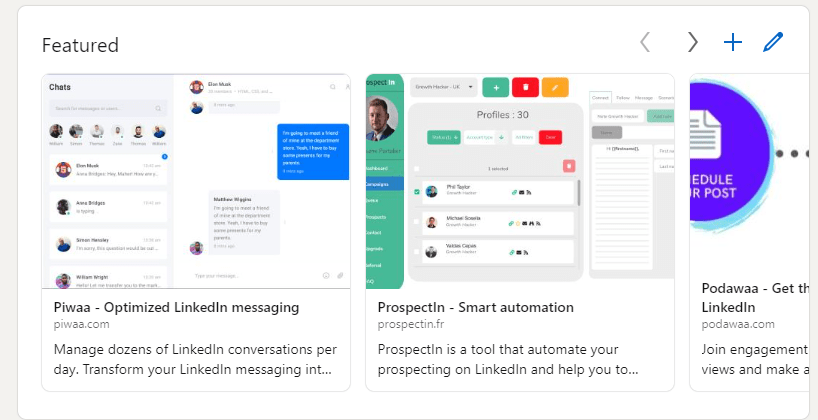
Before you had to put this in your summary and accessing the outbound links required 3 clicks. Today they are accessible in just one click. Take advantage of it!
Give the visitor something to write about: your best blog articles, your own website, your customer testimonials, etc… But above all, choose well the first 2-3: they are the most visible.
Work experience, education and training: be specific, be honest
Unless your employer has recruited you based on a fake CV, our 1st advice is: be honest.
After that, everything depends on your objective with your profile. With us, we are less interested in recruitment than we are in prospecting profiles and profiles who want to have a strong communication presence on LinkedIn.
For candidates who want to be recruited, present all your professional and voluntary experiences. Be exhaustive.
On the other hand, if your objective is to maximize “conversion rates” (this means people getting in touch with you, or/and going to your site or/and becoming more known), we recommend you only list relevant experiences, but are precise when describing them.
What do I mean by relevant?
An example: “I was a lifeguard for several summers”. This doesn’t bring much to my visitors. Much like, “I graduated high school with A+’s”. Nobody cares about that.
Highlight experiences that reinforce your expertise, support your proposition, or/and tells a story. Don’t make a resume that describes all the work you’ve done. Create a story, sell your expertise. Be original.
And the other sections?
They are not necessary for an optimized profile. The recommendations section and your interests section do not bring much to the visitor. This is my personal opinion on a recurring topic. But simply put, the rest doesn’t change much.
Think about translating your profile in order to show up on more searches
You have the possibility to translate your LinkedIn profile. You will appear more easily in certain search results if you choose this option. Having a profile in English is essential if your activity is international.

The brain retains original information better. Information that is different. So be creative. Stand out from the crowd. Don’t be like everyone else. Respect basic principles to optimize your LinkedIn profile while trying to stand out! 😁
Now, do you understand what’s at stake when it comes to lead generating on LinkedIn? Have you taken advantage of this opportunity to pamper your profile as it should be?
If not, you don’t need to read on. Call upon your creative genius and start writing your LinkedIn profile.
Once that’s done, come back here.
For the serious stuff, ready, you’ll be.

I know you can’t wait to get started. I can see you hopping on your desk chair.
Easy, here we come.
Is a mechanic who doesn’t know how to recognize a wrench, really a mechanic?
Well no, and the same goes for you, if you don’t know everything about LinkedIn before you start prospecting.
Before you start writing your prospecting messages, you need to know what tools you have at your disposal.
Our goal is to explain you all the tips you might never have thought of to use LinkedIn at its best.
Your mission is simply to use it. 😉



